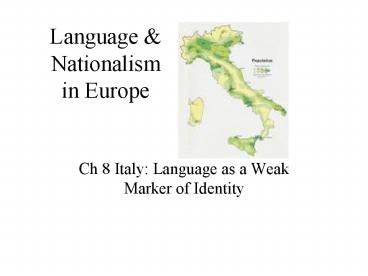Language - PowerPoint PPT Presentation
1 / 19
Title:
Language
Description:
Language in Italy, cont'd. Remember that dialects are sisters, ... Dialects in Italy ... 'Italy had been created, now it is the Italians who are to be made. ... – PowerPoint PPT presentation
Number of Views:217
Avg rating:3.0/5.0
Title: Language
1
Language Nationalism in Europe
- Ch 8 Italy Language as a Weak Marker of Identity
2
Overall role of language in Italy
- Language is a weak indicator of national identity
in Italy, despite substantial coincidence of
linguistic, national, and state boundaries - Late development of standard Italian reduced its
relevance to identity standard language has
become prevalent only with recent introduction of
mass media, and mutually incomprehensible
dialects remain local language varieties of choice
3
Italian identity politics
- There are distinctive families of mutually
intelligible dialects in certain territories that
have identities - Italian has a formal standard literary language
that is separate from any local spoken norm
(though there is a spoken version of the literary
language used by politicians) - These two facts sustain ethno-nationalist
sentiments
4
Lega
- Lega northern Italian separatist Lombardy
League - Initially used northern dialects as an
exclusionary device, but later adopted a popular
colloquial variant of Italian to gain support for
opposition to Rome - Rome and govt are perceived by many as distant,
unpredictable, corrupt -- motivating desire for
political self-determination
5
Language in Italy
- Most varieties in Italy are Romance, nearly all
are variants of Italian, based on Tuscan dialect - N dialects show Celtic influence Gallo-Italian
Venetian - S dialects Umbrian, Tuscan
6
Language in Italy, contd.
- Remember that dialects are sisters, not
daughters, of Italian - Many dialects have remained distinct, have a
variety of registers, and have produced valuable
literatures (e.g. 14th c Florentine) - Today most Italians know the standard language
and speak a dialect of Italian
7
Dialects in Italy
- Sardinian dialects -- a distinct language not
comprehensible to mainland Italians - Valle dAosta -- these dialects are
Franco-Provençal, not Italian, and in this region
both French and Italian are standard languages
8
Dialects in Italy, contd.
- Friuli region -- most people are bi/tri-lingual,
using standard Italian, German dialects, and
Friulian, which is a Romance dialect related to
Romansch of Switzerland (but considered by
Italians to be an Italian dialect)
9
Dialects in Italy, contd.
- Alto Adige/South Tyrol (NE border) --
bilingualism with German, official bilingualism
has defused demands for unification with Austria
10
Other small minorities with no political demands
- Slovene in NorthEast
- Albanian Italiot Greek in South
11
Back to Italian in Italy
- Italians from North and South often find each
others speech unintelligible - For most Italians, language is of secondary
importance, not a source of identity - Political fragmentation lasted until 19th c, and
this contributed to linguistic fragmentation - For centuries Latin was used as administrative
language - Early attempts to create a standard language were
based on archaic literature and did not inspire
real unification
12
Early nationalism
- Minimized internal linguistic differences for
unification purposes - Maximized external linguistic differences
- BUT The majority of Italians were never
particularly interested in the process of
national unification, or in the creation of a
national language.
13
1861 - Year of Italian Unification
- At that time, only 2.5 of the population spoke a
language called italiano, which was not a
marker of identity - the push for nationalism emerged from the
contempt the educated classes in cities had for
foreign occupiers, but the peasantry did not
follow this lead - Italy had been created, now it is the Italians
who are to be made.
14
But were the Italians ever made?
- In some sense, this never really happened
- Very high illiteracy rate persisted through
1930s, keeping access to standard Italian low
15
But were the Italians ever made?
- Fascism brought standard Italian to the masses
propaganda, films, universal primary education
emphasized pride in the nation and standard
Italian - Fascism brought a change from formal to familiar
address, avoidance of foreign borrowings, and
suppression of minority languages
16
After WWII
- After Fascism, fascist ideology, including
linguistic pride, receded - 1950s brought an economic boom, mass media, and
migrations, which helped spread standard
language - Political parties, trade unions, and social
movements also promoted spread of standard
language
17
Recent history
- 1960s-70s -- Large growth in proportion of
speakers of standard Italian -- grew to exceed
25 who use it exclusively, 32 who use it
alongside a dialect (diglossia) still,
proportion of people speaking standard Italian is
limited - Upper strata use/identify with standard Italian
the most - Dialects remain viable, gradually losing
distinctiveness due to mass communication and
geographic mobility
18
Language politics in Italy today
- Lega, which initially represented the North, now
has broader national appeal, perceives language
as a carrier of social identity, sought to
identify North Italian dialects as a separate
language, focus on street-tough, macho language - Recent resurgence of nationalist regionalist
sentiments
19
Language politics in Italy today, contd.
- Lack of national pride due to losing WWII, Mafia,
and other social ills, corruption - Standard Italian has become predominant, but has
lost its literary character































